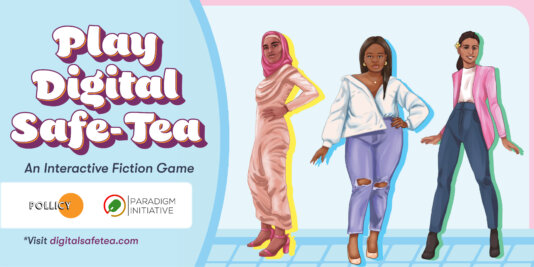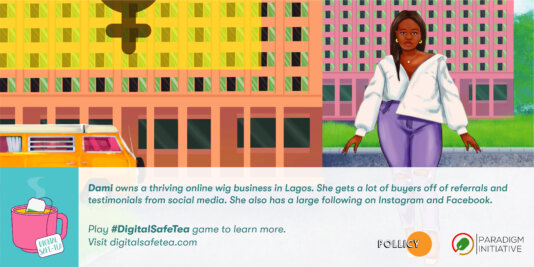- About
- Topics
- Picks
- Audio
- Story
- In-Depth
- Opinion
- News
- Donate
- Signup for our newsletterOur Editors' Best Picks.Send
Read, Debate: Engage.
| March 21, 2022 | |
|---|---|
| topic: | Digital Rights |
| tags: | #women's rights, #cybersecurity, #cyberbullying, #online harassment, #Africa |
| located: | Kenya, Ethiopia, Senegal, South Africa, Uganda |
| by: | Bob Koigi |
Pollicy, an East African feminist collective working at the intersection of data, design and technology is one of such innovators. They have come up with an interactive fiction game dubbed Digital SafeTea that is championing the safety of African women online while offering guides on tackling cyber discrimination and bullying.
The organisation’s Data and Digital Rights researcher, Garnett Achieng, spoke to FairPlanet about the digital safety space in the continent and the role of tech and research in promoting online safety, especially among the vulnerable.
FairPlanet: Tell us a bit about Digital SafeTea and what inspired you to come up with the interactive game? What did you hope to achieve with the project?
Garnett Achieng: Digital SafeTea is an interactive fiction game that was created by the tech and consulting firm Pollicy as a tool for digital safety training.
In 2020, Pollicy released a report on online violence based on a study from five African countries: Kenya, Senegal, Ethiopia, South Africa and Uganda. Some of the findings showed that while tech companies have reporting mechanisms against online harms, users do not know how to find and use them. Again, when people face attacks online it is hard to report the cases to tech companies or local authorities and therefore, they resort to leaving online spaces.
Then there is the digital security training space, where a lot of focus is on cybersecurity, which is the security of the digital infrastructure, but not the people. The little material in the digital space about security for people is buried in jargon and is quite complicated for the ordinary person. It is also not targeted for women.
Digital SafeTea was birthed by the need to have a feminist and woman-centred response to the digital security needs of African women in the continent.
We also wanted to make it available in as many African languages as we could. We currently have it in Luganda, Swahili, English and French and are hoping to soon have it in Nigerian Pidgin. This was to make sure that we covered Anglophone and Francophone Africa
How exactly does it work and what makes it unique?
The interactive game is guided by a story line with the stories of the three featured women, Aisha, Dami and Goitse, and depicts the daily lives of African women.
The scenarios are written in the back-end and encompass images and illustrations. We wanted to pay homage to the different African settings. For example, when playing the game as Dami, a Nigerian business owner, a player will see in the background a mural with the logo of Feminist Coalition (FemCo), a movement of Nigerian feminist who were at the forefront of the End SARS protests.
Another scenario is that of Goitse, a student in Botswana. Through her story, one is able to experience the challenges that young people face on the internet, including bullying and harassment.
Aisha’s scenario depicts the story of a person who runs a NGO that provides support to women, and the attacks she faces for being vocal.
Then there is Dami. Her story highlights her journey as a business owner and the challenges associated with running a business in the digital age. What makes the game unique is the blend of languages and the visuals.
What have been some of the challenges in this journey?
One of the key challenges was finding translators for the different languages.
It was also hard to communicate the digital security subject in the local languages because they could not bring out the depth of the messages like international languages would. It was an uphill battle to make the game engaging in other languages.
What would you say have been the challenges in achieving digital rights and security for women in Africa and how does Digital SafeTea seek to address them?
Subjugation of women's issues on the internet stands out. We are seeing research organisations all over the world talk about the magnitude of online gender-based violence.
Statistics from stakeholders have shown how there has not been enough focus from policymakers in addressing these issues with more attention, being on taxing the online platforms and how to prevent fake news, which in some cases is a way of controlling the narrative. There are no policy issues addressed or support offered. Gender issues in the digital space come as an afterthought. While other countries are legislating against online harm in a way that centres around users, in Africa it is more about profit, misinformation and disinformation.
As you create homemade solutions to local problems, do you feel African governments are doing enough to support entrepreneurs? What more should be done?
Tech companies are doing more than governments in supporting entrepreneurs, especially women entrepreneurs. For example, funding set aside by governments for youth and women entrepreneurs cannot compare in terms of reach to the one that is set up by tech companies. Yet tech companies continue to reach more of these entrepreneurs than governments.
What would you say has been the highlight of your project?
The feedback we get from people that they enjoy using the tool and their enthusiasm to continue using it. Our ultimate goal has always been to impact as many women as possible and make it easier for them to use online spaces and introduce them to the concept of digital security.
It has also been heartwarming to hear from digital security trainers that they have been using the game to teach young men and women in college with great impact.
What is the ultimate plan for Digital SafeTea moving forward?
We want to translate the game into more languages and we are looking for support so that we can get it to as many people as possible.
We would like to add more story lines that go beyond the urban women to target rural women, marginalised women, including refugees and LGBTQ people, among others.
Image by Christina@wocintechchat.com
By copying the embed code below, you agree to adhere to our republishing guidelines.



